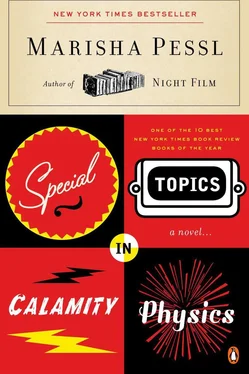It was early, approximately 5:15 P.M… and Hannah was the only one in the dining room apart from an elderly couple eating by the window. A gold, five-tiered chandelier at the center of the room hung like an upside-down duchess shamelessly exposing to the paying public her ankle boots and froufrou petticoat.
“Hello,” Hannah said, as we made our way to the table.
“The boys should be here in ten minutes,” said Jade, sitting down. “They had to wait for Charles to finish practice.”
She nodded. She wore a black turtleneck sweater, a gray wool skirt and the starched-and-pressed expression of someone running for office in the heat of an election, moments before he/she is to appear on a televised stage for a debate. There was a series of nervous gestures (a sniff, swipe of the tongue over teeth, a smoothing of skirt) and one weak attempt at conversation (“How was school?”) with ensuing lack of follow-up (“I’m glad.”). I could tell she was planning to say something very specific to us on this Special Occasion, and I grew worried as I watched her press her lips together and smile at her wineglass, as if mentally reviewing her cordial-yet-threatening greeting of the candidate of the opposing party.
I didn’t know what to do. I pretended to be enchanted by the giant menu with the dishes floating down the page in lacy handwriting: Puree of Parsnip-Pear Soup with Infusion of Black Truffle and Micro Greens .
My suspicions were confirmed when Charles and the others arrived, though she waited to deliver her speech until the skinny waiter took our orders then bounded away like a deer hearing rifle shots.
“If our friendship is to continue,” she said in a stiff voice, sitting too straight, sweeping her hair officially behind her shoulders, “and there were moments yesterday when I really thought it wouldn’t be possible — in the future, when I tell you not to do something, don’t do it.”
Staring at each of us, she let those words march all over the table, through the hummingbird plates and the wooden napkin rings and the bottle of pinot noir, around the glass centerpiece of roses craning their thin necks and yellow heads over the rim like newly hatched chicks desperate to be fed.
“Is that clear?”
I nodded.
“Yes,” said Charles.
“Yes,” said Leulah.
“Mmm,” said Nigel.
“What you did on Saturday was inexcusable. It hurt me. Deeply. On top of everything, everything so, so awful that happened, I still can’t quite fathom what you did to me. That you’d put me at risk, disrespect me so — because, let me tell you, in the only stroke of luck that night, Eva Brewster ended up not coming because her terrier was sick. So if it weren’t for a fucking terrier I’d be fired right now. Do you under stand? We’d all be fired, because if she had come, if she’d seen any of you, you would’ve been expelled. I guarantee it. I’m sure you weren’t drinking fruit punch and I couldn’t have pulled strings to get you out of it. No. Everything you’ve worked for, college, it’d be lost. And for what? A prank you thought would be fun? Well, it wasn’t fun. It was sickening.”
Her voice was too loud. Also jarring was her use of the word fucking, because she never swore. Yet Hyacinth Terrace gave no surprised stares, no waiterly raised eyebrows. The restaurant was meandering along like some humming grandmother refusing to accept the fact that the price of milk had gone up 600 percent since Her Day. The waiters bowed, deeply immersed in table settings, and across the room, a turnip-haired kid in a loose tuxedo walked to the piano, sat down, began to play Cole Porter.
She took a deep breath. “Since I’ve known each of you, I’ve treated you as adults. As my equals and friends. That you would treat our friendship with such flagrant contempt, it knocks the wind out of me.”
“We’re sorry,” said Charles in a thimble-voice I’d never heard before.
She turned to him, lacing her long, manicured fingers together in perfect This-is-the-church-this-is-the-steeple architecture.
“I know you’re sorry, Charles. It isn’t the point. When you grow up — and from the looks of things, you have a while — you learn things never go back to normal simply because everyone’s sorry. Sorry is ridiculous. A good friend of mine is dead. And, and I’m upset… ”
Hannah’s demoralizing soliloquy lasted all through the Appetizer and well into the Main Course. By the time our attending antelope sprung through the dining room to place dessert menus in front of us, we resembled a band of political dissidents in 1930s USSR after a year of laboring in Siberia and other brutal Arctic Lands. Leulah’s shoulders slumped. She looked harrowingly close to collapsing. Jade did nothing but stare into her hummingbird plate. Charles looked puffy and miserable. A doomed expression had torpedoed Milton and was in the process of sinking his entire bulky body under the table. Though Nigel showed no discernible signs of either sorrow or regret, I noticed he’d been able to eat only half of his Pride Hills lamb shank and had not touched his leek whipped potatoes.
I, of course, listened to every word she said and felt renewed sadness every time she looked at me without bothering to disguise her Utter Disappointment and Disillusion. Her Utter Disappointment and Disillusion didn’t seem as severe when she looked at the others, and I was certain my observation wasn’t an example of Dad’s “Theory of Arrogance”—that everyone always assumes they’re the Principal Character of Desire and/or Loathing in everybody else’s Broadway play.
Sometimes, apparently so distraught, Hannah let go of the rope of her words and came to a dead stop in a silence that stretched on and on, arid and relentless as far as the eye could see. The restaurant with its shines and clinks, its fanned napkins and resplendent forks (in which you could identify microscopic things lodged in your teeth), its dowager duchess hanging there, desperate to be let down to go dance a quadrille with an eligible man of society — it all felt indifferent and damned, hopeless as a Hemingway short story teeming with mean conversations, hopes lost between their bullet point words, voices voluptuous as rulers. Perhaps it was because on my personal timeline there was a small red rectangle positioned solely between the years 1987 and 1992, discreetly labeled NATASHA ALICIA BRIDGES VAN MEER, MOTHER, but I was aware now, as ever, that between all people there were First Times You See Them and Last Times You See Them. I felt certain this was a Last Time I See Them. We were going to have to say good-bye and this shiny place served as well a setting as any to be our terminus.
The only thing that kept me from melting onto my dessert menu was Hannah’s bedroom. The objects in that room annotated her relentlessly, gave me what I felt were secret insights into her every word and dart of her eyes, every crumple in her voice. I knew it was an appallingly professorial thing to do — Hannah finishing off an entire bottle of wine by herself illustrated how distressed she was; even her hair was exhausted as it slung itself across her shoulders and stopped moving — but I couldn’t help myself: I was Dad’s daughter and thus prone to bibliography. Hannah’s eye sockets looked gray, as if they’d been lightly shaded with one of Mr. Moats’ drawing pencils. 1She sat schoolhouse-strict. 2When she wasn’t berating us, she sighed, rubbed the stem of her wineglass between her thumb and forefinger the way commercial housewives notice dust. 3I sensed, somewhere within the context of these singular details, within her knife collection, empty walls, shoe boxes and thatch bedspread was Hannah’s Plot, her Principal Characters — most significantly, her Primary Themes. Maybe she was simply a matter of Faulkner: she had to be read very closely, word by painful word (never skimmed, pausing to make critical notes in the margin), including her bizarre digressions (costume party) and improbabilities (Cottonwood). Eventually, I’d come to her last page and discover what she was all about. Maybe I could even Cliffs Note her.
Читать дальше












